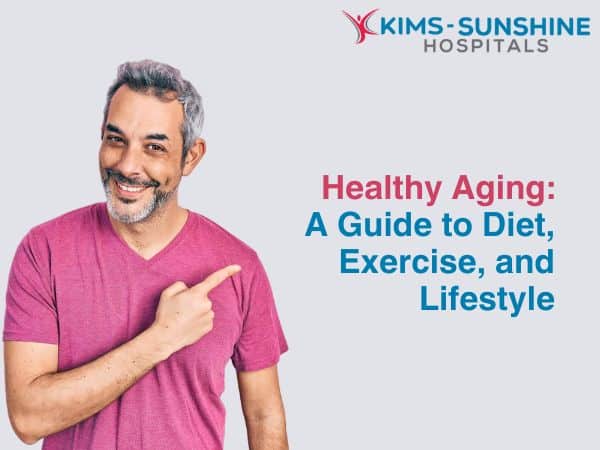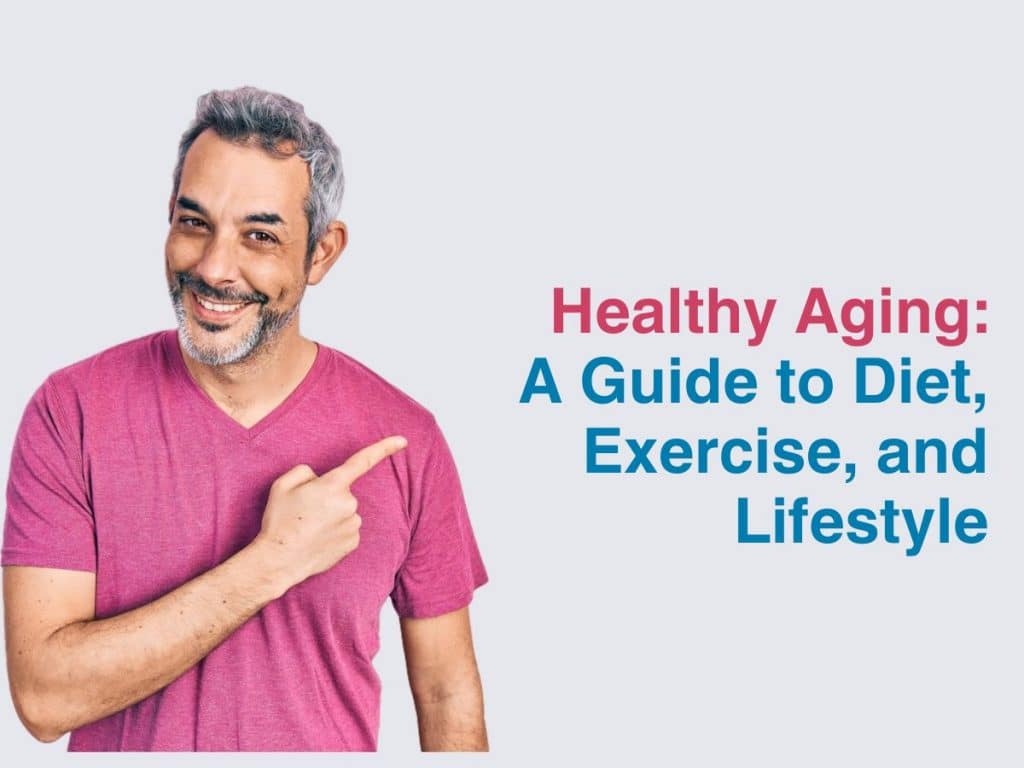
Healthy Aging: A Guide to Diet, Exercise, and Lifestyle

Aging is a beautiful process.
As we grow older, we’re empowered with life experiences that make us wiser and more well-rounded human beings.
While this is true, the unfortunate reality we’re often confronted with is that our physical bodies get weaker and we may be prone to facing more health challenges.
So, it is imperative to focus on health through balanced diets, a good exercise regime, and maintaining a healthy and happy lifestyle.
Making mindful choices can help us stay active, maintain our independence, and enjoy a high quality of life well into our golden years.
In this article, we discuss tips, tricks, and plans to be healthy, happy & hearty well into your 90s!
Let’s begin.
Tips for a Healthy Aging Diet Plan
As the years fly by, more and more people are acknowledging the importance of nutrition and the role it plays in the pursuit of healthy aging.
Nutrition is the foundation for healthy aging.
As our bodies change with age, our dietary needs shift.
Build your plate around these healthy eating tips for older adults:
• Focus on nutrient-dense whole foods like vegetables, fruits, whole grains, lean proteins, and healthy fats from nuts, seeds, olive oil, and avocados.
• Increase fiber intake from high-fiber foods to support healthy digestion.
• Consume calcium, vitamin D, and vitamin B12-rich foods for strong bones and blood cell health.
• Stay hydrated by drinking plenty of fluids like water, low-fat milk, or herbal tea.
Exercise Tips for Healthy Aging
Regular physical activity provides countless benefits for seniors.
It can help build strength, improve balance and flexibility, boost heart health, and maintain independence.
Aim for a well-rounded fitness routine that includes:
• Daily low-impact cardio like walking, swimming, or using an elliptical machine.
• 2-3 days per week of strength training with weights or resistance bands.
• Balance and flexibility exercises like yoga, Tai Chi, or stretching.
Lifestyle Changes for Aging Well
Beyond diet and exercise, cultivating healthy daily habits is key for successful aging.
Consider these lifestyle tips:
• Stay socially engaged through activities, classes, clubs, or volunteering.
• Challenge your mind regularly with puzzles, reading, or learning new skills.
• Prioritize quality sleep by sticking to a regular schedule.
• Avoid smoking and limit alcohol to support overall health.
• Manage stress through relaxing activities like meditation or deep breathing.
How to Stay Active as You Age
Making physical activity a priority gets harder as we get older due to barriers like pain, fear of injury, lack of motivation, limited transportation, or cost concerns.
But staying active is crucial for maintaining mobility and independence.
• Find activities you truly enjoy to stay motivated, like gardening, dancing, or sports.
• Start slowly and modify exercises or use chairs/walls for support as needed.
• Involve friends or family members to make it more fun and keep you accountable.
• Take advantage of low-cost community resources like parks, trails, and rec centers.
Physical Activity Recommendations for Seniors
To maintain health and function, most experts recommend older adults get at least 150 minutes of moderate aerobic activity like walking per week, plus 2-3 days of activities that promote strength, balance, and flexibility. Regular physical activity helps:
• Increase strength and stamina
• Improve balance and flexibility
• Support heart and lung health
• Manage weight
• Strengthen bones and muscles
• Enhance brain function
• Reduce risk of falls and injuries
Mental Health Tips for Seniors
Don’t neglect your mental and emotional wellbeing as you age. Stay socially and intellectually engaged, find meaning and purpose, manage stress, and don’t hesitate to seek help if you experience symptoms of depression, anxiety, or other mental health issues.
With some simple lifestyle adjustments tailored to your changing needs, you can stay active, nourished, and engaged as you experience the joys of healthy aging.
Conclusion
Aging well requires a holistic approach that combines healthy eating, regular exercise, mental engagement, and lifestyle habits that nurture your overall wellbeing. While getting older inevitably brings changes and challenges, being proactive about your health lets you maintain your independence, continue doing the activities you love, and truly embrace your golden years.
It’s never too late to start making positive changes. By filling your plate with nutrient-rich foods, finding physical activities you enjoy, staying socially and cognitively engaged, and prioritizing self-care, you can reap the incredible benefits of healthy aging. Minor adjustments to your daily routine can go a long way in promoting longevity and quality of life as you navigate this new chapter.
The key is to be consistent and place importance on caring for your mind, body, and spirit every day. With commitment and the right approach, you can minimize age-related declines and maximize your health span—allowing you to get the most out of your later years with vigor and vitality. Take it one day at a time, and embrace the journey of healthy aging with optimism.






